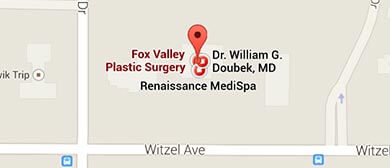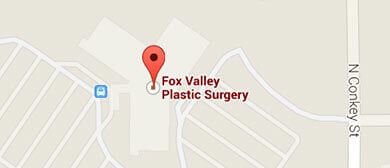Call Us: (920) 233-1540
VenaSeal™
 The VenaSeal™ closure system is designed to close varicose veins by injecting a very small amount of proprietary medical adhesive (glue) inside of the vein. It is indicated for use in the permanent closure of lower extremity superficial truncal veins, such as the great saphenous vein (GSV), through endovascular embolization with coaptation. The vein is then compressed with ultrasound and remains closed.
The VenaSeal™ closure system is designed to close varicose veins by injecting a very small amount of proprietary medical adhesive (glue) inside of the vein. It is indicated for use in the permanent closure of lower extremity superficial truncal veins, such as the great saphenous vein (GSV), through endovascular embolization with coaptation. The vein is then compressed with ultrasound and remains closed.
The accredited Vein Center at Fox Valley Plastic Surgery expertly treats all vein issues. Some practices have a doctor, instead of a registered vascular technician, perform the ultrasounds. This is never done at FVPS because a registered vascular sonographer is vastly superior to a doctor in his/her level of ultrasound expertise of the veins. Our skilled surgeons and technicians are helping women and men from places such as Green Bay, Appleton, Fond du Lac, Sheboygan, Milwaukee, Madison and upper Michigan, perfect their personal Renaissance. Contact the Vein Center at (920) 233-1540 to request a vein consultation.
How does VenaSeal differ from thermal energy procedures?
 Venaseal is the only FDA approved procedure that uses injection of medical adhesive to close veins. Because this adhesive works immediately to cause venous closure, compression stockings do not need to be worn after the procedure. Thermal procedures such as RFA and EVLA or chemical irritation of the vein, do not cause immediate closure, so compression stockings need to be worn post procedure.
Venaseal is the only FDA approved procedure that uses injection of medical adhesive to close veins. Because this adhesive works immediately to cause venous closure, compression stockings do not need to be worn after the procedure. Thermal procedures such as RFA and EVLA or chemical irritation of the vein, do not cause immediate closure, so compression stockings need to be worn post procedure.
Who is eligible for VenaSeal?
VenaSeal is intended for use in adults with clinically symptomatic venous reflux as diagnosed by duplex ultrasound (DUS). VenaSeal system is contraindicated when any of the following conditions exist: previous hypersensitivity reactions to the VenaSeal adhesive or cyanoacrylates, acute superficial thrombophlebitis, thrombophlebitis migrans and acute sepsis.
Although this procedure can be used on many patients with superficial venous reflux, many insurance companies do not cover this procedure. We currently only perform this procedure on patients with eligible insurance coverage. Patients, who wish to pay for this procedure out of pocket, should contact the office for a quote.
 What can I expect of the VenaSeal procedure?
What can I expect of the VenaSeal procedure?
Before the procedure:
You will have an ultrasound imaging exam of the leg that is to be treated. This exam is important for assessing the diseased superficial vein and planning the procedure.
During the procedure:
The provider can discuss the procedure with you. It is performed as an outpatient in the office. The procedure typically takes 1-2 hours and only requires a small amount of local anesthetic (numbing medication). A brief summary of what to expect is below:
- You may feel some minor pain or stinging with a needle stick to numb the site where the doctor will access your vein.
- Once the area is numb, your doctor will insert the catheter (i.e., a small hollow tube) into your leg. You may feel some pressure from the placement of the catheter.
- The catheter will be placed in specific areas along the diseased vein to deliver small amounts of the medical adhesive. You may feel some mild sensation of pulling. Ultrasound will be used during the procedure to guide and position the catheter.
- After treatment, the catheter is removed and a small adhesive bandage placed over the puncture site.
After the procedure:
The provider will recommend follow-up care as needed. Compression stockings do not need to be worn after a Venaseal procedure. There is a follow-up ultrasound in 2 weeks to verify that the vein remained closed. Additional follow-up office appointments with ultrasound will be performed at 3 months and 12 months following the procedure in order to document long term closure of the treated vein.
Real Patient Story
 Read about Paul’s experience in our Vein Center and other real patient stories in Real Patient Stories. As an avid athlete, Paul had a heart and muscles like someone half his age. His limiting factor were his legs. As the aching and exhaustion grew worse, he discovered that he had venous reflux disease, a highly treatable disease for the accredited Vein Center at FVPS.
Read about Paul’s experience in our Vein Center and other real patient stories in Real Patient Stories. As an avid athlete, Paul had a heart and muscles like someone half his age. His limiting factor were his legs. As the aching and exhaustion grew worse, he discovered that he had venous reflux disease, a highly treatable disease for the accredited Vein Center at FVPS.
When will my symptoms improve?
Symptoms are caused by the diseased superficial vein. Thus, symptoms may improve as soon as the diseased vein is closed.
 When can I return to normal activity?
When can I return to normal activity?
The VenaSeal procedure is designed to reduce recovery time. After the procedure patients should walk for 10-15 minutes. Over the next two weeks, walk daily and avoid very long periods of inactivity. Depending on the symptoms many patients are able to return to normal activities very shortly following the procedure.
To learn more about this procedure, contact the Vein Center at Fox Valley Plastic Surgery at (920) 233-1540 to request a personal vein consultation.
Is the VenaSeal procedure painful?
Most patients feel little, if any, pain during the outpatient procedure. Most patients report little-to-no bruising after the VenaSeal procedure.
Is Venaseal safe?
Venaseal is FDA approved for the treatment of superficial venous insufficiency/reflux. All medical procedures have some risk. The adverse events associated with the device are similar to those with traditional endovenous thermal ablation procedures. In addition, there are several risks unique to the VenaSeal system due to its material and product design as an implant.
These potential adverse events include, but are not limited to, allergic reactions to cyanoacrylates, such as hives, asthma, hay fever and anaphylactic shock, arteriovenous fistula, bleeding from the site of access, deep vein thrombosis (DVT), edema in the treated leg, embolization, including pulmonary embolism (PE), hematoma, hyperpigmentation, infection at the access site, non-specific mild inflammation of the cutaneous and subcutaneous tissue, pain, paresthesia, phlebitis, superficial thrombophlebitis, urticaria or ulceration may occur at the site of injection, vascular rupture and perforation, visible scarring.
What happens to the VenaSeal adhesive?
Only a very small amount of VenaSeal adhesive is used to close the vein. The body will naturally create scar tissue around the adhesive over time to keep the vessel permanently closed. This adhesive is considered a medical device and will be left in the vein.
 We recommend the purchase of Dermaka Cream for $34 to minimize bruising and inflammatory responses of the skin after a procedure. It works best by applying it five days before a procedure, and then after the procedure until no longer needed. Our patients have had excellent results with the cream, which can also be used for eczema, rashes, dry skin, etc. Learn more on Dermaka.com, or download the patient booklet here.
We recommend the purchase of Dermaka Cream for $34 to minimize bruising and inflammatory responses of the skin after a procedure. It works best by applying it five days before a procedure, and then after the procedure until no longer needed. Our patients have had excellent results with the cream, which can also be used for eczema, rashes, dry skin, etc. Learn more on Dermaka.com, or download the patient booklet here.
Real Patient Results
We love to see the smiles on our patients' faces when they look and feel their best. See the results for yourself.
Photo Gallery Request a ConsultationPricing
While many insurance carriers cover varicose vein treatment, some individual insurance companies may limit the types of therapy which are covered. Coverage may depend on the severity of the varicose veins and symptoms. We will check to see if your plan covers this expensive, but safer treatment. Our experience with insurance pre-authorization showed limited insurance coverage for this treatment. Coverage changes routinely so pre-authorization is required. Patients are still ultimately responsible for any co-pays, deductibles, and any other non-covered insurance charges.
Cash vs. Insurance
- Patients with a high deductible insurance plan, may feel they will never meet the deductible and prefer to pay a cash price. We offer special pricing for patients who elect to personally pay for a procedure. The insurance allowed amount is generally much higher than the out of pocket cost.
- Some patients want a procedure done right away and do not want to wait for a prior authorization decision from their insurance plan. This can be accomplished by paying for the procedure out of pocket.
- Some patients do not have insurance. We offer special pricing for procedures that are not billed to insurance. Full payment must be made before a procedure is performed.
- Patients who wish to pay for their procedures out of pocket, need to waive their right to insurance coverage for their procedures.
Patients without insurance or who do not wish to use insurance, should call for an individual consultation to get a custom quote for vein treatment.
 We recommend the purchase of Dermaka Cream to minimize bruising and inflammatory responses of the skin after a procedure. It works best by applying it five days before a procedure, and then after the procedure until no longer needed. Our patients have had excellent results with the cream, which can also be used for eczema, rashes, dry skin, etc. Learn more on Dermaka.com, or download the patient booklet here. While it is available on Amazon.com for $32, we sell it in the office for $29 as a convenience to our patients.
We recommend the purchase of Dermaka Cream to minimize bruising and inflammatory responses of the skin after a procedure. It works best by applying it five days before a procedure, and then after the procedure until no longer needed. Our patients have had excellent results with the cream, which can also be used for eczema, rashes, dry skin, etc. Learn more on Dermaka.com, or download the patient booklet here. While it is available on Amazon.com for $32, we sell it in the office for $29 as a convenience to our patients.



Oshkosh, WI (920) 233-1540